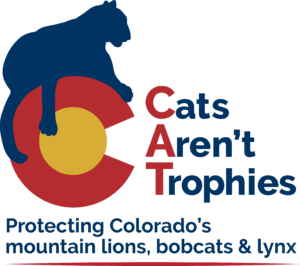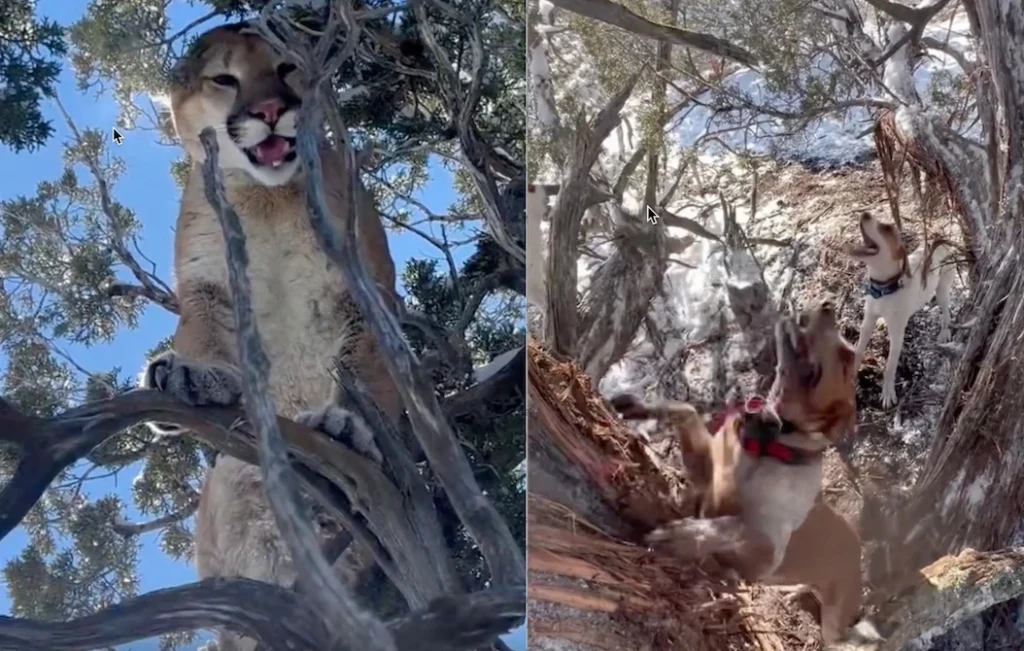PRESS RELEASE


- For Immediate Release:
- Contact:
- Julie Marshall
- 720-255-9831
- Email Julie here
Prop 127 Spurs Diverse Public Engagement, Government Accountability at CPW Meeting Friday Over Mountain Lion ‘Management’
Animal wellness groups pleased to hear commissioner question ‘fair chase’ and clarify recreational hunting is not necessary for ‘population control.’ Agency must now invest in lion’s beneficial role for healthy ecosystems, groups say
Lafayette, CO — Animal wellness groups are pleased to see evidence Friday that Proposition 127 is already resulting in greater public engagement, awareness, and government accountability over the just treatment of ecologically important native mountain lions of Colorado. Voters rejected Prop 127, but much of the opposition did not express opposition to halting trophy hunting and commercial trapping of lions and bobcats, but they urged proponents of these reforms to seek redress by giving Colorado Parks and Wildlife and the Colorado Wildlife Commission first crack at necessary changes.

Dozens of citizens who supported Prop 127 commented on record Friday over a new “East Slope Mountain Lion Management Plan” at CPW’s November meeting in Lamar. The plan was voted to progress forward.
Many citizens expressed disapproval in hounding as that flouts CPW’s own fair chase policy, given that Colorado trophy hunting guides paid $8,500 send dog packs out first to contain a mountain lion in a tree for shooting like fish in a barrel. The shooter is not part of the hunt, and follows behind to catch up just to shoot the animal that has nowhere to go. And that it is a guaranteed kill for on-call killing.
CPW does not legally allow guaranteed killing in recreational hunting, yet Colorado lion hunts are routinely advertised as “guaranteed.”
Commissioner Dr. Karen Bailey, an ecologist, stated on record Friday that she heard these concerns and is interested in investigating this further, noting that it is possible that holding a cat in a tree with dogs, waiting for the shooter to arrive, would indeed violate CPW’s own policy.
Prop 127 supporters also raised the issue that the East Slope Plan is called “management” in the title, “for stable populations,” but pointed out the best peer-reviewed and published science informs commissioners that recreational hunting is not necessary or even management, because lions are territorial predators who will manage their own populations naturally, without hunting. Just as they do in California, which bans hunting and has a stable lion population.
When called to testify to this precise statement, CPW longtime retired carnivore manager Jerry Apker confirmed to commissioners that lion populations are self-regulating, which means their populations do not require hunting as a “necessary” tool to regulate them.
“The ideas behind Prop 127 are solid and broadly supported,” said Julie Marshall, a native Coloradan and public relations director for Animal Wellness Action, one of the leading organizations behind Prop 127. “We want to give CPW and the Colorado Wildlife Commission an opportunity to dig into the issue and then to institute these needed reforms.”
Animal wellness groups are now calling on CPW to invest more heavily in managing mountain lions for their proven role as ecosystem engineers, who boost the health of deer herds and whole ecosystems. They also note that hounding and orphaning of lions are unacceptable outcomes from the highly commercialized, unsporting trophy hunts that are now conducted — and that have nothing to do with proper management of lions or bobcats.
You can listen to the meeting here: Parks and Wildlife Commission Meeting: November 14-15, 2024 | Colorado Parks and Wildlife
Animal Wellness Action is a Washington, D.C.-based 501(c)(4) whose mission is to help animals by promoting laws and regulations at federal, state and local levels that forbid cruelty to all animals. The group also works to enforce existing anti-cruelty and wildlife protection laws. Animal Wellness Action believes helping animals helps us all. Twitter: @AWAction_News
Cats Aren’t Trophies (CATs) is a broad and diverse coalition of Coloradans that includes nearly 100 wildlife and other organizations that believes that trophy hunting of mountain lions and bobcats is cruel and unsporting — a highly commercial, high-tech head-hunting exercise that doesn’t produce edible meat or sound wildlife management outcomes, but only orphaned cubs and social chaos among the surviving big cats.